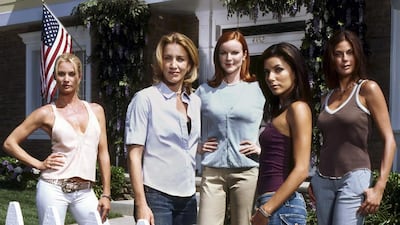I heard a story once about a Hollywood screenwriter who was out of ideas. He had run through most of his money, had been the victim of an unscrupulous talent agent (something that happens more often than people think) and wound up a 40-year-old man living back in his childhood bedroom, in the house he grew up in.
During the day he’d potter around the house, trying to come up with a terrific career-saving idea for a television script. He’d take walks around the neighbourhood, an antiseptic and drab suburban housing development, searching for inspiration, trying to figure out what the television audience wanted to see. At night, he’d settle on the sofa with his elderly, widowed mother and watch television, trying to ignore her constant and annoying chatter about whatever was on screen.
He was, of course, miserable.
One evening, though, while watching a news report with his mother, something happened. The report was about some unspeakable and lurid crime – a young mother in Texas who had slipped into madness and drowned her own children – and when the story was over, he heard his mother mutter to herself: “Hey, we’ve all been there.”
“Who is this person?” he thought to himself as he looked back at his mother. “And what does she mean by ‘We’ve all been there’?”
Her comment, casually delivered, sent him back upstairs to his childhood bedroom, to his schoolboy desk, where he wrote a script that tried to explain how certain suburban wives and mothers can suddenly go bonkers.
The script was called Desperate Housewives and it became one of the biggest hits on American television. His career re-ignited, the offers poured in and he was back on top. All because he decided, at the perfect moment, to stop trying to figure out "what they want" and, instead, to listen to his mother.
Whenever a screenwriter sits down to start a new project, it’s a major temptation to ask this doomed and unanswerable question: “Before I sit down to write, first tell me: what do they want? What’s selling these days, at the studios and networks? Because I don’t want to waste time writing something no one wants.”
That, of course, is a terribly attractive, and terribly foolish, question to ask – and not just in the entertainment business but in every other business, and in life. Ask people what they want and they’ll force themselves to make something up, just to give you an answer.
Henry Ford, the manufacturing and marketing genius behind Ford Motor Company, and the man more responsible than anyone for the introduction of the automobile, once said, essentially, that he never asked his customers what they wanted. Had he asked, he averred, they’d have said “faster horses”.
Steve Jobs, the impresario of Apple, designed and built the first iPhone despite the total lack of evidence that anyone, anywhere, wanted an expensive touchscreen smartphone. But, as we all now know, they most certainly did.
Henry Ford and Steve Jobs may not have conducted elaborate customer surveys to unearth the desires of the worldwide consumer, but both men paid attention to what people were doing with newfangled objects. Ford watched how early car owners retrofitted and adjusted their vehicles. Jobs paid attention to what people really did with their heavy and over-powered computers and he knew that they’d be thrilled with a smaller, lighter version. Neither one asked the buyers what they wanted. Instead, they just paid attention to the world around them. They listened to their mothers, in other words.
That kind of insight is available to all of us, no matter what business we’re in.
For instance, if you use the smartphone navigation app Waze – which is another way of saying, if you’re a person who drives a car in a crowded city – you’ve probably had this experience: Waze finds the shortest route to your destination, not the simplest or the straightest. So it often ends up taking you through residential side streets and out-of-the-way places. It also means, during the moments you’re not desperately trying to follow the zigs and zags of a typical Waze route, that you drive through unfamiliar streets and notice unfamiliar things. Waze, in a sense, forces you to pay attention to world around you, to listen to your mother when she’s muttering odd things.
For the past month, I've been trying to come up with my next script. I know the story of the iPhone and the Ford Model T, I know how the blockbuster show Desperate Housewives was inspired. But still, sitting down yesterday with a blank sheet of paper and infinite possibilities, I caught myself asking, "OK, so what do they want? What are audiences – and studio and network executives – looking for?"
In other words, my first impulse was to take the tried and familiar path, rather than take a roundabout Waze route. And that’s really, in the end, the only way to get anywhere.
Rob Long is a writer and producer in Hollywood
On Twitter: @rcbl

